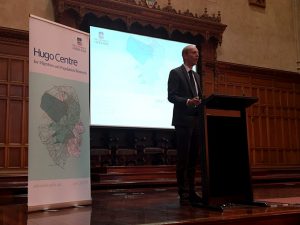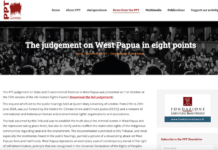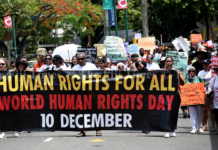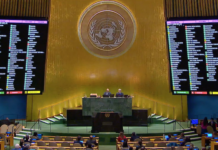The global refugee system is failing … here is how it can be fixed, says Professor Alexander Betts. Video: TedTalks
By Jeremaiah M. Opiniano in Adelaide
Allowing refugees to be economically active in host societies may help solve a “broken” refugee system, says an Oxford University academic.
Professor Alexander Betts of Oxford’s Refugee Studies Centre told the audience at a public lecture hosted by the University of Adelaide’s Hugo Centre for Migration and Population Research recognition of refugees’ economic potentials would possibly create a “sustainable refugee system fit for purpose in the 21st century”.
Dr Bett’s view comes as European countries continue to struggle to accommodate Syrian refugees fleeing civil conflict and extremism.
In the US, President Donald Trump has slashed the maximum number of refugee entries to 45,000 in 2018, said to be the world leader in refugee resettlement’s most restrictive number in 70 years.

Myanmar and its Nobel laureate, Aung San Suu Kyi, continue to receive flak over the country’s brutal crackdown on some 370,000 Rohingya refugees.
Australia has been criticised by the UN Special Rapporteur on Torture for “violating” the rights of asylum seekers to be free from torture and inhuman or degrading treatment, all of which was dismissed by former Prime Minister Tony Abbott.
The country continues to hold some 2200 refugees and asylum seekers in offshore detention centres on Nauru.
Refugees own businesses
Citing findings by a Refugee Studies Centre’ survey of South Sudanese and Somali refugees in Uganda, Dr Betts said refugees are not economically isolated.
Dr Betts said a fifth of refugees surveyed by the centre owned a business, with 40 percent of employees being Ugandan.
He said refugees in Uganda had approximately 200 “distinct livelihood activities” run by skilled professionals.
Less than one percent of refugees surveyed had no formal income-generating activity, Dr Betts added.
“The findings in Uganda show what’s possible when refugees are given those opportunities,” Dr Betts said.
Over the past year, Uganda had taken in 1.3 million people – the equivalent of 2000 people a day fleeing famine, drought and violence – more than what any European country accommodated in the 2016 refugee crisis, Dr Betts added.
The economic success of refugees presented a different picture in Kenya amid stricter regulations, the centre’s survey showed.
Reliance on community
This is due to the fact refugees are only able to work in some refugee camps.
Dr Betts and his team found refugees in the camp at Kakuma rely more on community leaders, family and neighbours than they do on the social services provided by international organisations and NGOs.
His team also found the greatest barriers to being economically active related to supply and demand for goods, rather than life’s daily struggles in refugee camps.
Well known for research which reframes refugees as economic contributors, Dr Betts has pushed for the fusion of refugees into countries special economic zones.
The Refugee Studies Centre worked with Jordan to pilot the “Jordan Compact”, which allowed Syrian refugees to work in manufacturing companies found in these special economic zones.
Jordan was willing to grant 200,000 work permits to Syrian refugees across three to five years. In return, multilateral organisations gave Jordan concessionary loans and tariff exemptions.
Dr Betts said the project had achieved “mixed results”, however.
‘Innovative’ pilot project
Only 51,000 Syrian refugees had work permits – 2 percent of which were women – while a handful of multinational investors invested in Jordan.
“The Jordan Compact is an innovative pilot where lessons can be learned in spite of the most strict regulatory environments.
“Refugees have access to work, labour rights and forms of labour protection while helping rebuild post-conflict Syria,” Dr Betts said.
With global data revealing 10 developing countries host 60 percent of the world’s refugees, Dr Betts called on countries to rethink their refugee systems.
He said refugee assistance should be a combination of rescue, autonomy, and a “route out of limbo”.
This could be achieved through reimagining resettlement policies and visa systems for refugees.
“Even with rescue and autonomy, it is surely not reasonable for refugees to remain in limbo for more than five years,” he said.
“There may be alternative ways to manage these movements sustainably to benefit refugees and host countries.
“It will start by helping people help themselves.”















































